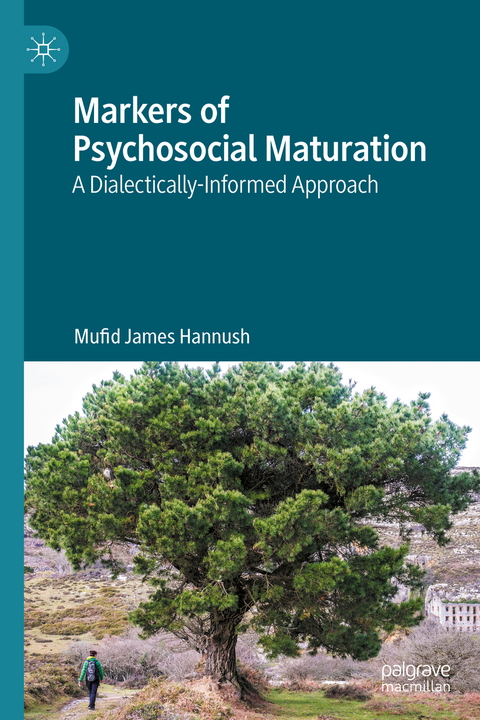
Markers of Psychosocial Maturation
Springer International Publishing (Verlag)
978-3-030-74314-7 (ISBN)
lt;b>Mufid James Hannush was Associate Professor of Psychology at Rosemont College in Rosemont, USA. Professor Hannush is the author of Becoming Good Parents: An Existential Journey (2002).
1. Introduction.- Part I The Capacities for Self-Analysis, Self-Understanding, and Self-Transcendence.- 2. Self-Analysis: The Capacity for Self-Analysis Through Self-Reflection.- 3. Self-Understanding: The Capacity for Self-Understanding and Insight into the Self.- 4. Self-Transcendence: The Capacity for Self-Transcendence Through the Suspension of Belief/Judgment.- Part II The Capacities for Balance, Feelings, and Creativity.- 5. Balance: The Capacity to Establish and Maintain a Dialectical Balance Between Polar Lifeworld Meanings.- 6. Feelings: The Capacity to Balance One's Feelings and Come to Terms with the Ambivalences and Ambiguities of Existence.- 7. Creativity: The Capacity for Creativity and Creative Living.- Part III The Capacities for Aesthetics, Goodness, Kindness, and Truth.- 8. Aesthetics: The Capacity for Relational Aesthetics.- 9. Goodness: The Capacity for Goodness.- 10. Kindness: The Capacity for Kindness.- 11. Truth: The Capacity to Seek, Find, and Be in the Service of Emotional and Relational Truth.- Part IV The Capacities for Companionship and Aloneness.- 12. Companionship: The Capacity for Companionship and Friendship.- 13. Aloneness: The Capacity to Be at Home with Aloneness, Silence, and Solitude.- Part V The Capacities for Self-Esteem, Flexibility, and Resilience.- 14. Self-Esteem: The Capacity for Self-Esteem Regulation.- 15. Flexibility: The Capacity for Flexibility.- 16. Resilience: The Capacity for Resilience.- Part VI The Capacities for Acceptance, Authenticity, and Responsibility.- 17. Acceptance: The Capacity for Acceptance of Self, Others, and Life Itself.- 18. Authenticity: The Capacity for Authenticity, Congruence, Genuineness, and Realness.- 19. Responsibility (Response-Ability): The Capacity for the Acceptance, Assumption, and Owning of Responsibility.- Part VII The Capacities for Holding, Trust, andHope.- 20. Holding: The Capacity for Holding and Containing the Self/Other.- 21. Trust: The Capacity to Trust Self and Others.- 22. Hope: The Capacity for Realistic Hope.- Part VIII The Capacities for Empathy, Relating, and Repairing.- 23. Empathy: The Capacity for Empathy.- 24. Relating: The Capacity for Healthy Relating.- 25. Repairing: The Capacity for Repairing Relational Ruptures.- Part IX The Capacities for Irony, Joy, Love, and Work.- 26. Irony: The Capacity for Cultivating a Sense of Irony.- 27. Joy: The Capacity for Joy and Enjoyment as Manifested in Humor, Laughter, and Playfulness.- 28. Love: The Capacity to Love and Be Loveable.- 29. Work: The Capacity for Generative Work.- Part X The Capacities for Suffering and Mourning.- 30. Suffering: The Capacity to Endure Suffering.- 31. Mourning: The Capacity for Mourning and Working Through Loss.- 32. Conclusion.
"Hannush's work is a psychoeducational tour de force on psychosocial maturation. ... The reader will appreciate that each chapter as a dedicated reference page(s) ... . This scholarly text would be excellent support for a graduate-level course in psychosocial maturation as well as lifespan development. ... Without doubt, the reader will enjoy much wisdom in this book. ... This instructive, comprehensive, and perceptive book thus ends with optimism and hope for our enduring and maturing selves ... ." (Robert McInerney, Journal of Phenomenological Psychology, Vol. 53 (1), 2022)
| Erscheinungsdatum | 17.07.2021 |
|---|---|
| Zusatzinfo | X, 540 p. |
| Verlagsort | Cham |
| Sprache | englisch |
| Maße | 155 x 235 mm |
| Gewicht | 941 g |
| Themenwelt | Geisteswissenschaften ► Psychologie ► Allgemeine Psychologie |
| Geisteswissenschaften ► Psychologie ► Klinische Psychologie | |
| Medizin / Pharmazie ► Medizinische Fachgebiete ► Psychiatrie / Psychotherapie | |
| Schlagworte | Existentialism • existential-phenomenology • existential psychology • hermeneutics • Human Development • human psychological maturity • phenomenological psychology • pluralism in psychology • Psychosocial Development |
| ISBN-10 | 3-030-74314-4 / 3030743144 |
| ISBN-13 | 978-3-030-74314-7 / 9783030743147 |
| Zustand | Neuware |
| Haben Sie eine Frage zum Produkt? |
aus dem Bereich


